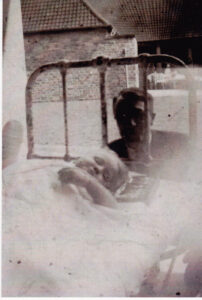Shout out: Bovine Tuberculosis and Family History

My father, Harry died recently. We were collaborating on a project about his early life
Does bovine tuberculosis appear in your family history?
When I was seven years old, I begged Dad to write about his childhood experiences. I did not understand why he flinched at my suggestion. As I grew older, Dad said, ‘When I was two, they wrote me off as a “cripple” incapable of learning – a “cripple” who should be kept away from “normal” people.’ With the insensitivity of a child, and fascinated by his life, I continued to ask questions. Dad told me he remembered his white-hot fury when he was taken from his mother and put into an isolation hospital because he had been diagnosed with bovine tuberculosis. He vividly recalled the feeling of ‘someone was going to pay’.
Dad explained that following the medically sanctioned removal from his family and community, his mind became his playground because for most of his preteen years he was trapped in a full-body plaster cast, only able to move his head and left arm.[i] His right hip and left elbow were being eaten away by the Mycobacterium bovis he had consumed in the unpasteurised milk that was delivered twice a day to his working-class home.
He spent most of his first decade in the isolated King Edward VII Orthopaedic Hospital, Sheffield, where in all weathers he lived on the veranda outside the boys’ ward. Provoked by sensory deprivation and extreme social isolation, Dad formed a deep connection to the natural world as he lay sheltered by the numerous trees that surrounded the hospital. The hospital authorities banned books and toys because ‘they transmitted infection’. On the ward there were no pictures on the wall, no lessons, no radio. If the ward did not cancel the visit, Dad would see one of his parents, usually his mother, for one hour on a Sunday, once a month, but no more.
Over the last twenty years, I jotted down the snippets he told me, saying, ‘If you don’t write about your life, I will.’ In recent years, I quizzed him more about the family and his experiences. Despite his emotional scars, he generously dug deep to answer as clearly as he could. After he was diagnosed with a terminal illness in February 2022, we began collaborating in earnest. He said he had changed his mind about a book because tuberculosis is on the rise, and it is becoming resistant to antibiotics. He recognised that his story no longer simply represented the hidden, unbelievable truth of hundreds of thousands of British children disabled by Mycobacterium bovis. It could also raise awareness of the historical, psychological price paid by the child survivors and their descendants, and remind policymakers around the world of the necessity to finally bring this devastating infection to an end.[ii]
At Dad’s funeral, I committed to carrying on the project, not only to raise awareness of the psychological legacy of what so many children have experienced, but to inform the current effort worldwide to address the impact of Mycobacterium bovis on health and well-being. I would therefore be grateful if you got in touch to share pictures, memories, or questions if you or your family were affected by bovine tuberculosis or its treatment.
http://parkerdrabble.innovationitsupport.com/
Twitter: @HelenPDrabble
Facebook: @FactualTales
Pinterest: @HelenPDrabble
LinkedIn: Helen Parker-Drabble
[i] WellcomeFilm. “Fillet and Spica Plaster (1936): Entire Title.” YouTube. YouTube, September 23, 2014. https://www.youtube.com/watch?v=Z77fNgHjQYI.
from 8.41 minutes
[ii] Benyahia, A, A Dean, A Elldrissi, E Erlacher-Vindel , S Forcella, P I Fujiwara, G Gifford, J Lubrot, F Olea-Popelka, and G Torres. 2017. “Roadmap for Zoonotic Tuberculosis.” World Health Organization. World Health Organization. https://www.who.int/publications/i/item/9789241513043.
About The Author
Helen Parker-Drabble is a counsellor by profession and a genealogist and family historian by experience. According to the online Cambridge dictionary, one of the definitions of therapy is it is a ‘treatment that helps someone feel better or grow stronger’. So as a geneatherapist, I aim to explore mental health, mental illness, and psychology through different eras, in the hope that by exploring what impacted our ancestors we help the present generation.
Helen is also a life-long explorer of social history and weaver of factual family tales, with a Diploma in counselling. Fascinated by psychological theory and the stories we develop to make sense of ourselves and our family, Helen’s original quest was to understand her Victorian grandfather, Walter Parker, born in 1885 in Upwell on the Norfolk/Cambridgeshire border.
Family history doesn’t survive unless it’s in print, which is why Helen set out to write an engaging and accessible biography that would not only explore working-class Victorian life in an English village but could motivate and encourage other family historians struggling to pass on what they have painstakingly discovered. The result, in part, is an exploration of transgenerational legacy of loss, trauma, anxiety and depression.
About A Victorian’s Inheritance
Anxiety. Addiction. Depression.
We associate these words with the challenges of modern life.
Rarely do we consider how these conditions shaped past generations.
Using archival sources, testimonies, and her grandfather Walter Parker’s experiences, the author not only paints a vivid picture of life in an English Victorian village. She also draws upon psychological theory to explore the lives of her working-class ancestors.
What did your forebears inherit from their parents?
Which psychological characteristics did your ancestors hand down?
A Victorian’s Inheritance can help you find answers.
To read some of Helen’s first book, A Victorian’s Inheritance, go here and click on Your first two chapters are waiting (at the bottom of the page).
Who Do I Think You Were? A Victorian’s Inheritance by Helen Parker-Drabble is an accessible exploration of the life, times and psychological inheritance of Walter Parker, a Victorian working-class youth growing up at the Tank Yard in the English village of Thorney, on the 11th Duke of Bedford’s forgotten estate.
This is not the story of just one man, but of an era. The information and theories introduced in this book can help connect us to our ancestors. They can inspire us to be more mindful of the psychological legacy we leave behind.Does bovine tuberculosis appear in your family history?
